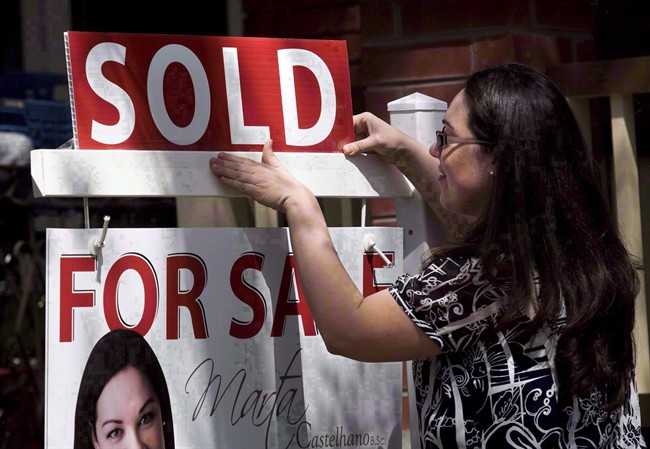It’s easy to see why using a line of credit to help pay for a down payment is tempting for many Canadians.

It now takes about 7.5 years to save up for a down payment on a house in Toronto. In Vancouver, that number is over 10.5 years.
The data comes from the National Bank of Canada, which calculated how much it would take a median-income earner in several cities across Canada to save up enough for the minimum down payment on a median-priced home assuming they saved 10 per cent of their income.
WATCH: New study claims it will take 23 years to save for down payment in Metro Vancouver

Elsewhere in Canada, of course, things aren’t so bad. In Montreal, Calgary and Edmonton, for example, coming up with the money takes about 2.5 years, the National Bank estimates.
But regardless of where you live, you might have wondered whether it wouldn’t make sense to borrow in order to boost your down payment.
WATCH: Larger down payments now needed from first-time buyers of homes over $500,000

If you’re in Toronto and Vancouver, that would allow you to quickly enter the market before you’re priced out for good.

Get weekly money news
Elsewhere, it might be a way to afford a bigger home.
But piling debt on debt is never a good idea.
There are at least three things that could change and quickly turn what looked like a smart financial strategy into a debt nightmare, warned Douglas Hoyes, a licensed insolvency trustee at Ontario-based Hoyes Michalos.
1. Your costs go up or your income goes down
Maybe you can carry the cost of your mortgage, plus that of a line of credit.
“But what else will you need to borrow for?” asked Hoyes.
Homebuyers often forget to plan for the “perfectly predictable costs” of homeownership, noted Hoyes. For example, it’s pretty much a law of physics that, at some point, you’ll have to replace your roof, but people often neglect to factor that in, he added.
It’s also fairly common for people to rack up debt immediately after they’ve moved into a new home, as they pay for furniture and everything else they need to set up their new living quarters. But if they’re already carrying a mortgage and a line of credit for the down payment, they might quickly find themselves mired in debt.
READ MORE: The number of young Canadians going bankrupt is rising — but student debt isn’t the whole story
Of the struggling borrowers he sees in his practice, homeowners are the ones who have the most unsecured debt, Hoyes told Global News.
There’s also the scenario in which your hours at work are cut back or you lose your job. What then?
Of course, you could sell your home and get enough money back to reduce or erase your debt, but that would only work if prices keep going up, said Hoyes.
READ MORE: Heartbroken and bankrupt: Why divorce can destroy your finances
2. Home prices stop rising
You don’t need a housing crash for things to go south if you’re a highly leveraged homeowner.
If you ever need to offload the house in order to make ends meet, you’d actually need prices to keep rising to avoid losing money, explained Hoyes.
Say, for example, that your house cost $1 million and you could sell it today for the same price. That would not cover costs such as your real estate agent’s commission or the penalty for breaking your mortgage. The expenses inherent in selling a house can add up to between six per cent and eight per cent of the original purchase price, according to Hoyes.
READ MORE: Questions to ask yourself before taking on more debt
If you only had five per cent equity in the home, the sale might cost you rather than free up cash, he noted.
And if home prices do fall, you could quickly find yourself in a situation where the amount people are willing to pay for your house is lower than your outstanding debt, said James Laird, president of brokerage firm CanWise Financial.
READ MORE: Why Canada wins, but many Torontonians lose, from Ontario’s new housing measures
3. Interest rates rise
Then there’s the risk that interest rates will go up. If the Canadian economy continues to strengthen, that might happen as soon as the end of this year, as Global News has reported.
A decision by the Bank of Canada (BoC) to hike rates wouldn’t immediately affect most Canadians’ mortgage rates, but it would raise the interest rate on most lines of credit, noted Hoyes.
READ MORE: Could you handle a 33 per cent interest-rate hike on your debt? If not, start paying it off now
Variable-rate mortgages would also go up following a rate increase by the BoC, he added.
Holding both a variable-rate mortgage and a line of credit would result in a double-whammy of increased debt-servicing costs that few borrowers would be able to absorb, said Laird.
READ MORE: Have you heard about savings loans? Think carefully before signing up for one








Comments
Want to discuss? Please read our Commenting Policy first.